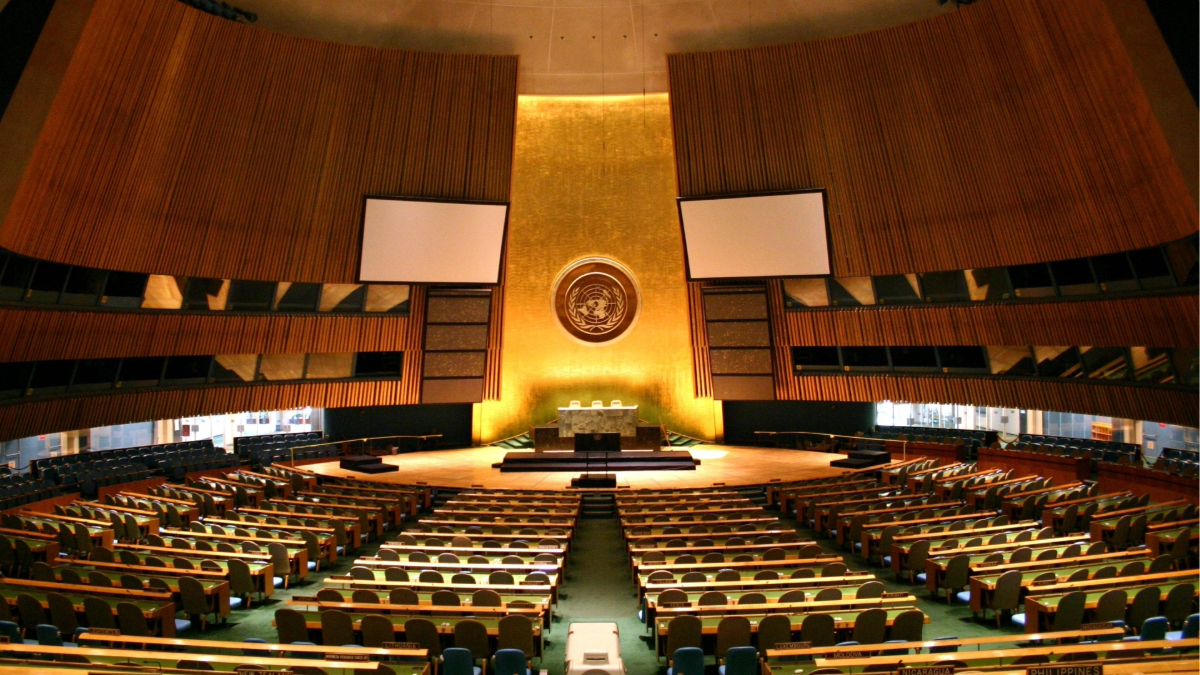UN Launches AI Panel and Dialogue, But Questions Linger Over Inclusion and Impact
Amaj Rahimi-Midani / Sep 11, 2025
United Nations General Assembly hall. Patrick Gruban/Flickr. CC by 2.0
On August 26, after months of difficult negotiations, the United Nations General Assembly achieved a historic milestone: all 193 Member States reached consensus on one of the most consequential questions of our time — how should artificial intelligence be governed.
Under the co-facilitation of Costa Rica and Spain, governments agreed to establish an Independent International Scientific Panel on AI and to launch a Global Dialogue on AI Governance. This resolution is more than just another UN document — it marks the first collective attempt to place AI governance within the world’s most universal forum, where every country has a voice.
Based on recommendations made nearly a year earlier by the UN High-Level Advisory Body on AI, which called for creating a scientific panel and a global policy dialogue, alongside proposals for a global AI fund to reduce inequalities between developed and developing nations, the process was designed to engage a broader international process, involving a range of stakeholders beyond powerful states or technology companies.
The promise and the pitfalls
But the resolution is also imperfect. Unless its shortcomings are addressed, this bold new framework risks repeating mistakes that have haunted past international efforts — from climate accords to nuclear treaties — where grand commitments faltered in the absence of accountability and enforcement.
The Scientific Panel will comprise 40 independent experts, selected to ensure geographic and gender balance, who will publish annual reports on the risks, opportunities, and impacts of AI. The UN Secretary-General has been tasked with launching an open, criteria-based nomination process. On paper, this is an important safeguard. But the resolution also stipulates that no more than two experts can share the same nationality or institutional affiliation. This seemingly technical rule could have unintended consequences: it may exclude world-class talent, especially those with dual nationalities or overlapping institutional ties, while still leaving room for powerful states to exert quiet influence over appointments.
If selections are seen as political rather than merit-based, the Panel could lose credibility before it even publishes its first report.
Gender representation
Another test will be gender representation. The resolution calls for balance, but without clear language, “gender balance” risks becoming a checkbox exercise. The US delegation rightly stressed that the UN must ensure meaningful participation of women and girls, especially from the Global South. Civil society has echoed this concern: ARTICLE 19 warned that the Panel and Dialogue risk symbolic inclusion if they are not explicitly anchored in human rights and gender equity
Too often, UN bodies tout parity while falling short on substance. For this Panel to be legitimate, women must not just be present — they must shape outcomes, bringing perspectives that are indispensable to understanding how AI transforms societies.
The “global” dialogue
The second pillar of the resolution, the Global Dialogue on AI Governance, is designed as an inclusive forum for governments and stakeholders to exchange ideas, best practices, and solutions. In principle, this could be groundbreaking. But the road to adoption tells a cautionary tale.
Across eight months of negotiations, civil society, academia, industry, and communities most affected by AI were only invited twice — for a couple of hours each time. The rest of the process unfolded in closed, government-only consultations. If this imbalance continues, the Dialogue risks devolving into an intergovernmental echo chamber, where inclusivity is promised but not delivered.
The warnings are already visible. Iran openly declared that selection of experts “must remain firmly under the authority of Member States,” a view quietly shared by others. Such positions undermine the very independence the Panel was meant to safeguard. If political bargaining overrides scientific merit, the body could become yet another arena for state influence rather than a trusted source of impartial guidance.
The resolution also acknowledges the vast capacity gaps in AI — technological, ethical, cultural, and linguistic — but defers solutions to future discussions. This is worrying. Without concrete commitments to financing, training, and knowledge transfer, the gulf between advanced AI powers and developing countries will only deepen.
China, in its statement, pointed to its July 2025 World AI Conference, where it launched a global AI governance action plan and proposed creating a new international AI cooperation organization. Whether such parallel initiatives compete with or complement the UN process remains to be seen.
A call to build, not just debate
Despite its flaws, this resolution is a milestone. It proves that even in an era of geopolitical fragmentation, consensus is still possible on how to govern transformative technologies. But the real work begins now.
If the Panel is transparent, merit-based, and truly inclusive — and if the Global Dialogue becomes a platform where all voices are heard, not just states — then the UN will have planted the seeds of a global system that treats AI as a shared challenge and a shared opportunity.
AI will shape every society and every generation to come. Whether the UN’s first step leads to lasting governance will depend on what happens next: whether Member States choose to guard their interests or to nurture a framework that belongs to all of humanity.
Authors
